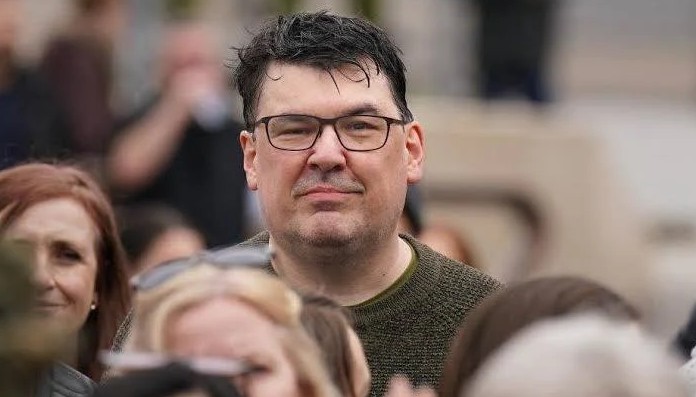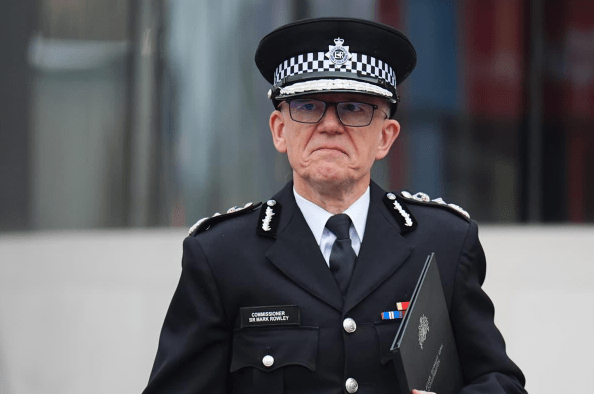Metropolitan Police Commissioner Sir Mark Rowley has defended his officers’ controversial arrest of comedian Graham Linehan, while warning the force must not become the arbiter of online culture wars.
Sir Mark has broken his silence after days of mounting pressure surrounding Linehan’s arrest over anti-trans posts on X (formerly Twitter), stating that his officers were following current laws but urging the Government to urgently revise legislation.
“I don’t believe we should be policing toxic culture wars debates. Officers are currently in an impossible position,” said the Met chief.
The Father Ted writer was detained at Heathrow Airport on Monday after returning from Arizona, reportedly by five armed officers. The arrest relates to three social media posts deemed to be inciting violence.
Linehan later wrote on his blog that he was arrested “like a terrorist” and is now banned from using X as part of his bail conditions. He is due for another police interview in October.
The arrest has drawn political scrutiny, with Health Secretary Wes Streeting remarking: “The Met should focus on policing streets, not just policing tweets.”
Labour leader Sir Keir Starmer also weighed in through his spokesperson, stating that police priorities should include tackling “anti-social behaviour, shoplifting, street crime, and serious violent crimes like knife crime and violence against women”.
Rowley: Officers Followed the Law But Change Is Needed
In a detailed statement, Sir Mark Rowley explained that officers had reasonable grounds to arrest Linehan under the Public Order Act: “While the decision to investigate and ultimately arrest the man was made within existing legislation, which dictates that a threat to punch someone from a protected group could be an offence, I understand the concern caused.”
One of Linehan’s tweets allegedly said to “call the cops” on trans-identifying people and “if all else fails, punch him in the balls”.
Another read: “I hate them. Misogynists and homophobes. F*** em.”
Linehan has since claimed the tweets were a “serious point made with a joke”.
Sir Mark acknowledged that genuine threats of violence must be dealt with seriously, but questioned whether police should be drawn into less clear-cut cases involving speech online.
“When it comes to lesser cases, where there is ambiguity in terms of intent and harm, policing has been left between a rock and a hard place.”

Balancing Free Speech and Safety: The Met’s Dilemma
This case has opened up new discussion regarding where the boundary is drawn between freedom of speech and inciting harm.
- Opponents say police should not get involved in satire or insulting speech with no real threat.
- Adherents emphasize that online abuse can become real-life harm, and not acting on such posts sends a bad message.
Sir Mark is seeking immediate clarification from the Home Office regarding what is and isn’t a police issue.
He believes legislative tweaks could bring “greater clarity and common sense”, reducing wasted resources and allowing officers to focus on serious threats.
“If agreed, we could be ready to test new approaches quickly, within a matter of weeks,” he added.
Political Response: A Call for Law Reform?
Mr Streeting hinted that new legislation could follow: “It’s very easy for people to criticise the police. The police enforce the laws of the land. If we’re not getting the balance right, that’s something we all have to look at.”
Downing Street has so far declined to comment directly on Linehan’s arrest, calling it an “operational matter for the police”.
Linehan Facing Trial Over Earlier Incidents
In addition to the recent arrest, Linehan is scheduled to appear at Westminster Magistrates’ Court on Thursday over two separate charges:
- Allegedly harassing transgender activist Sophia Brooks via social media.
- Allegedly damaging Brooks’s phone in an incident last October.
He denied the charges in a previous hearing held in May.
A Career Tarnished by Controversy
Previously hailed for co-writing Father Ted and The IT Crowd, Linehan has increasingly been recognized for his transphobic hate speech online.
His X (formerly Twitter) account was banned in 2020 for “repeated violations” of hate speech and manipulation on the platform.
His descent from heroism illustrates a wider, divisive debate unfolding in the UK: How would society and the law address speech that offends but doesn’t necessarily threaten?
This case may frame the future of online policing and reopen debate over where free speech meets hateful behavior.






